The Life of Pope St. Pius X
By the Editor
Giuseppe Melchior Sarto, the future Pope Pius X, was born June 2, 1835 in the small village of Riese in the province of Venice. He was the second and eldest surviving son of Giovanni and Margherita Sarto. His father was a letter-carrier in Riese and his mother often worked as a seamstress. The family was quite poor, but a very good and happy one.
Giuseppe (or Beppi as his mother called him) was a sprightly boy, and so great was his exuberance that sometimes his teacher had to control his liveliness with a wooden cane on the backside. Nevertheless, he was an excellent student and would never go out and play until all his homework was completed. After an energetic game or sport was played in the evening, he would stop into the little church for a 10-minute visit with Our Lord before returning home for supper and bed.
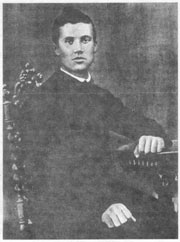 Giuseppe Sarto as a young priest. He was ordained at 23. |
Giuseppe became an altar boy at a young age, and as he put his whole heart into everything he did, he became the leader of the altar boys and an M.C. at 10 years of age.
The village school of Riese had only two classes. At age 10 Giuseppe had finished those elementary courses. To continue his studies he would now have to walk four miles to Castelfranco Veneto. For four years he had to get up very early; he attended the first Mass in his parish church, hurried home for a little breakfast of a cup of coffee and dry bread, and then set out on his four mile walk carrying his books and a sandwich for lunch. Very often he also carried his shoes to prolong their life.
Sometimes the other students would tease him about his shabby clothes or meager lunch of bread and a little cheese or corn meal, but he never complained, and so cheerful and good was he that he became a favorite amongst his companions. He was also a top student, forever taking first place in school subjects and conduct.
After finishing his fourth year at Castelfranco, Giuseppe wanted to go to the seminary to study for the priesthood, but his poor father had no money to pay the tuition. Don Fusarini, the parish priest, wrote to apply Giuseppe for a scholarship. His marks in school were all excellent but there were so few scholarships available. At last the wonderful news came that he was given a free place in the seminary at Padua.
Because of the hard and disciplined life he had to lead just to get through school, Giuseppe had no difficulty with the seminary's strictness. He was never a problem, always obedient and cheerful, he scored high marks consistently and gave the highest of promise.
One day, late in his second year, Giuseppe Sarto, with tears in his eyes, asked permission to go home. "But why?" asked the rector. "Because my father is gravely ill," replied Giuseppe, although no human voice had told him. His manliness and resignation on the occasion of his father's death in May of 1852 merited the young Sarto further praise from his professors.
Giuseppe had a great love of church music, and in his latter years in the seminary, he was in charge of the music at the seminary.
Having left nothing but the highest of marks and esteem, Giuseppe finished his 8 years in the Seminary of Padua by being ordained a priest on September 18, 1858. The first assignment of the 23 year old was as curate, or assistant at Tombolo.
Don Giuseppe Sarto was an untiring worker. His bedroom lamp was the last thing on of an evening and the first light on in the morning. He slept only about four hours to devote as much time as possible to study and prayer. He very soon became a fine preacher. He would read his sermons to the pastor, Don Constantini, and changed whatever the pastor suggested. One of his first sermons was called "rubbish" by the good pastor who only wanted to help Don Giuseppe as much as he could. So Don Giuseppe set out to work again with the result that Don Constantini exclaimed, "Beautiful, Don Beppi; but you must be careful, for it would never do to have the curate preaching better than the parish priest!"
Don Sarto was an excellent curate—full of charity and zeal. He started classes to teach reading and writing, took care of the sickly pastor and gave away to the poor every dime he earned. For eight and a half years he labored as an assistant at Tombolo. The parishioners considered Don Sarto a saint, saying his name should be Don Santo.
At 32, Don Giuseppe was appointed pastor of the important parish of Salzano. Here his charity for the poor increased as his funds increased. His sister Rosa, who did his cooking, once complained: "Giuseppe, the meat for dinner has disappeared out of the pan." "The cat may have stolen it," smiled her pastor-brother.
He spent himself completely for his flock at Salzano with the result that it became a model parish under his care. The people loved him, for they recognized that God worked through him. Once a large stack of hay had caught fire near a cottage. Don Sarto arrived on the scene as the flames began to lick the house. The people were frantic. "Don't be afraid, the fire will be put out and your house will be saved!" Don Sarto shouted. At that very moment, the flames, as though by a mysterious command, turned about in the other direction leaving the cottage practically unharmed.
After spending over eight years as parish priest, he was appointed, much to his distress, a Canon of Treviso in the capacity of diocesan chancellor, and spiritual director at the seminary with the title of Monsignor. This three-fold job kept poor Msgr. Sarto quite busy. During the day he worked at the episcopal palace, aiding the bishop in the various and difficult affairs of the diocese. As a Canon he chanted the office in the cathedral, and gave the rest of his time to the spiritual formation of his seminarians. He even gave up his only recreation, an evening walk, to prepare some little boys for their first communion. At the seminary he was very popular with both the seminarians and the staff. At table in the refectory his amusing stories, sly teasing of certain professors, and the interesting discussions he started delighted the others and made him greatly missed whenever he was absent. Monsignor Sarto continued to work long into the night as he had done while a pastor and curate, causing his neighbor in the seminary to sometimes call out, "Go to bed, Monsignor, he works ill who works too long." "Quite true Don Francesco," would come the answer, "Put that into practice—go to bed and sleep well."
When he was informed that he had been nominated as Bishop of Mantua, Msgr. Sarto was shocked. Everyone else knew one day he'd wear the mitre, but not Don Giuseppe. He wrote to Rome expressing his unfitness, as he saw it, for this office. He was simply told to obey; that it was manifestly the will of God.
Msgr. Sarto was consecrated a bishop on November 16, 1884 in Rome. The humble bishop went back to Riese to visit his mother. She kissed his ring devoutly, and then with a smile she said, "But you would not have this fine ring, son, if I did not have this." And she showed him her worn wedding ring.
As the new Bishop of Mantua, the future pope took care first of his clergy. Seemingly overnight he straightened out the Seminary of Mantua. It had actually been closed before he took office, so Bishop Sarto made an ardent appeal to the diocese. The people and clergy responded immediately and with such generosity that within a few years, the seminary was able to house 147 students. To ensure a firm foundation for his seminary, he carefully chose his professors and increased the Philosophy and Theology courses, laying special stress on the doctrine of St. Thomas Aquinas. Bishop Sarto took upon himself the responsibilities of Rector, and sometimes would walk into a class and take his place among the students, listening and asking questions of the professor.
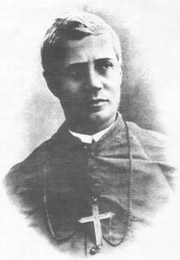 Bishop Sarto of Mantua. He was Bishop there 1885-1894. |
Bishop Sarto was constantly at work, and his next task was a canonical visitation of all the parishes in his diocese. He did not want any pomp and ceremony when he came into a parish but said, "The most acceptable reception for me is to enter the parish early in the morning and find a large number of faithful recollected in prayer in the church." Sometimes he came totally unexpected to a parish, completely surprising the pastor. It was known to him that a certain pastor had the bad habit of arriving late in church almost every morning, the result being that the faithful could not go to confession before Mass. One morning, late as usual, the priest came into the church and saw his place taken in the confessional by a stranger. He angrily walked over and pulled back the curtain of the confessional only to find himself face to face with his bishop!
A great lover of the catechism, Bishop Sarto preached and taught everywhere in the diocese; even the smallest of parishes had heard him speak. His door was always open, as was his heart, especially to the poor. His motto was: "Little for self and all for the poor." He dealt with everyone in this simple and humble manner.
His great work in Mantua had been closely observed by Pope Leo XIII who created Msgr. Sarto a Cardinal, and then three days later appointed him the Cardinal-Patriarch of Venice. He could not leave for Venice immediately because the Italian government claimed they had the right to appoint the successor to the see of Venice. Hence a struggle ensued over the rights of the Church and State, during which Cardinal Sarto stayed in Mantua. The Mantuans were overjoyed for their Bishop at his appointment as Cardinal, but sad at the thought that they were soon to lose him to Venice. At this time the Cardinal's sisters wrote him saying that their mother desired to see him for a last time. Margherita wept tears of joy as she pressed to her bosom her son, now a Cardinal of the Church. Her feeble voice, choked with tears, could utter only a few words: "My son, give your mother a last blessing." He did so with great filial love, and then pressed his lips to her forehead knowing that this was his last farewell to her on earth.
When Cardinal Sarto made his solemn entry into Venice on November 24, 1894, the windows of but one house remained closed and unadorned; the Town Hall with its Freemason Council. "Be without fear;" he told his flock, "if they shut the windows we will open them." He had in mind the coming elections. And when the elections came on July 28, 1895 the Cardinal's words were fulfilled. Principally through his efforts the Freemasons were voted out of office, not to trouble the Venetians as governors for many years.
As at Mantua, Cardinal Sarto took great care of his clergy and always sought to instill in them a personal love for Jesus Christ in the Blessed Sacrament. With this end in view he held a Eucharistic Congress in 1897. It was a great success as multitudes of Venetians adored Our Savior all hours of the day and night.
As a devoted Pastor of souls, Cardinal Sarto rarely left Venice. Leo XIII once said to him: "Your Eminence should come more often to Rome; you are a welcome visitor." But Cardinal Sarto was continually spending himself for his flock, denying himself even sleep to work for the Venetians. One of his greatest joys as Cardinal-Patriarch of Venice was when he climbed to the top of a hill to bless a statue of Mary commemorating the beginning of the 20th century. Many feared the climb of 1,500 feet would be too great a strain for the 66 year old Cardinal, but he responded, "to honor the Mother of God nothing was too great a strain."
On July 20, 1903 Pope Leo XIII passed away and on July 26th, Cardinal Sarto bade farewell to Venice. "Come back soon, Eminence!" the people shouted. "Dead or alive I shall return to you," the Cardinal answered. An enthusiastic crowd cheered their good Cardinal who would not return alive.
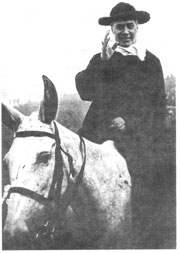 Cardinal Sarto of Venice riding up Mount Grappa in 1901. |
Cardinal Sarto never believed he would be elected pope. As a matter of fact, he used to laugh when anybody suggested it. However he once joked, "You know I'll become pope or I'll die; that the series might not be broken. I was a curate in Tombolo for nine years, and for nine years I was pastor at Salzano, then for nine years chancellor at Treviso. After that I was Bishop of Mantua for nine years, and now I have been patriarch of Venice again for nine years. So either I become pope now, or I die." "In that case," said his companion, "I hope for the former." "And I for the latter," responded Cardinal Sarto, "Rather dead than pope."
In one of the meetings held in preparation for the Conclave to elect the new pope, the French Cardinal Lécot spoke to Cardinal Sarto in French. "I'm afraid I do not speak French," Cardinal Sarto replied in Latin. "But if your Eminence does not speak French you have no chance of being elected because the pope must speak French," commented Cardinal Lécot. "Deo Gratias!" said Cardinal Sarto, "I have no desire to be pope." But God's plans were different for the poor Cardinal from the country.
On the first ballots, Cardinal Rampolla, who had been secretary of state under Leo XIII, received the most votes, but even in the beginning Carta Sarto received the third most votes. And with each ballot his votes increased.
The Austrian-Hungarian monarchy delivered a veto against Cardinal Rampolla in the fourth session, but it's probable that this had no effect, as the Cardinals considered it an outrage and mostly ignored it.
As his votes mounted, Cardinal Sarto began to beg the Cardinals not to vote for him. "I am absolutely unworthy and incapable of the Papacy.... For the love of God, forget me!" He then proceeded to enumerate his many faults and weaknesses to try and persuade the Cardinals against him. But it was to no avail. The result of the seven ballots was as follows:
|
First ballot: |
Rampolla 24, |
Gotti 17. |
Sarto 5, |
scattered 16. |
|
Second ballot: |
Rampolla 29, |
Gotti 16, |
Sarto 10, |
scattered 7. |
|
Third ballot: |
Rampolla 29, |
Gotti 9, |
Sarto 21, |
scattered 3. |
|
Fourth ballot: |
Rampolla 30, |
Gotti 3, |
Sarto 24, |
scattered 5. |
|
Fifth ballot: |
Rampolla 24, |
Gotti 6, |
Sarto 27, |
scattered 5. |
|
Sixth ballot: |
Rampolla 16, |
Gotti 7, |
Sarto 35, |
scattered 4. |
|
Seventh ballot: |
Rampolla 10, |
Gotti 2, |
Sarto 50. |
Cardinal Sarto was going through an agony of prayer when the secretary of the conclave, Msgr. Merry del Val, found him in the Pauline Chapel. He had been sent to gain Cardinal Sarto's acceptance. Comforting the suffering Cardinal, Msgr. del Val reminded him that the Lord would help him. A mutual esteem for one another came about at that first meeting. Msgr. del Val considered Cardinal Sarto a saint, and when he finally accepted the papacy, Cardinal Sarto would ultimately choose this young Msgr. del Val as his secretary of state and create him a Cardinal.
Many Cardinals came and reminded Cardinal Sarto that it was God's will and he must accept if he did not wish to offend God. On the morning of August 4, 1903 Cardinal Sarto received an overwhelming majority of votes and all eyes were upon him. He finally rose and said, "If it is impossible that this cup passes away, God's will be done. I accept the election, as a cross."
"What name do you wish to take?" asked the Dean of the Cardinals.
There was a period of silence, but then the new pope answered: "As the Popes who have suffered most for the Church during the last century were called Pius, I too shall take that name."
From the beginning of his Pontificate, Pius X impressed all who met him by his common sense intelligence, kind nature and strength of character.
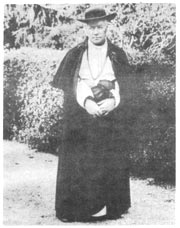 Pius X walking in the Vatican Gardens. |
Pope Pius X was remarkable in his humility and simplicity. Though now he held the highest office in the world, nothing about the man had changed. As he said, the only thing that changed was the color of his cassock. Even at Venice he had worn a black cassock. "Look," he said to an old friend, "look how they rigged me out. Don't I look conspicuous in these white robes?" And it was necessary to remind the good Pope not to wipe his pen on his sleeve as he had been used to doing with his black cassocks.
The order of Pope Pius X's day was quite similar almost every day. He rose at 4:00 a.m. and said Mass at 6:00. Very punctually he was at his desk at 8:00 in his private study on the second floor of the Vatican. Here he received private audiences. His large desk was usually loaded with papers and documents; in the center stood a crucifix flanked by statues of the holy Curé of Ars and St. Joan of Arc. At noon Pope Pius X held his general audience, and then at 1:00 he had lunch with his two secretaries. For centuries, or rather since Urban VIII in 1623, the popes had always eaten alone. But Pius X could not bring himself to do this; conversation at his meals was really his only recreation, and so for the eleven years of his pontificate this "custom" was done away with. After lunch he rested a little before returning to his heavy duties and responsibilities. Supper was at 9:00, but even after this Pius X went back to work until well into the night.
"Instaurare omnia in Christo; to renew all things in Christ" was his motto and program of action. Modernism had seeped into the Church; many Catholics were of the opinion that the Church must bring her doctrines into line with modern development. A wave of insurrection against the teachings of the Church flowed through the world, and the saddest thing was that leaders were recruited from the ranks of the clergy. Modernism was and is basically a system of errors which denied the possibility for human reason to understand anything not perceived by the senses. Hence, in practice it denied supernatural revelation and natural theology, reducing religion to something that merely comes from within us; a need in our subconscious. Pope Pius X saw the dangers of this terrible error calling Modernism "the synthesis and poison of all heresies which tend to undermine the fundamentals of the Faith and to annihilate Christianity." Against this heresy Pius X wrote the powerful encyclical "Pascendi Dominici Gregis" in 1907, and issued later condemnations of many beliefs of the Modernists in his Syllabus or Summary of their errors.
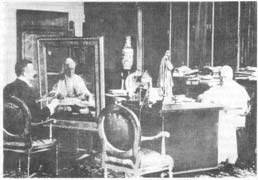 Dutch artist Von Well paints Pius X in his private study. |
And to bring the reign of Christ back to the common people, Pius X would preach each Sunday afternoon in the Vatican courtyards to the people of Rome. His sermons were, as they had been in Venice, Mantua and Salzano, preached with great unction and wisdom, yet in a simple manner so all could understand.
Pope Pius X was known as the Pope of the Eucharist, not only because of his great personal love for Our Savior in the Blessed Sacrament, but also because of two wonderful decrees he issued. The decree "Sacra Tridentina Synodus" encouraged all to receive Christ frequently and even daily in Holy Communion. Prior to Pope Pius X. it was not the custom to receive Communion so often. Many people, even very pious ones, would usually only receive once or twice a month, and many received only on great feast days. Another decree, "Quam singulari Christus amore" fixed the age for the reception of First Communion "at seven and in some cases even earlier," (when they had reached the use of reason). Once a little four year old boy was presented before the pope; the mother stating that he was quite smart and that she hoped in just a couple years he'd be able to receive First Communion. Turning to the little boy, the Pope asked, "Whom do you receive in Holy Communion?" "Jesus Christ," answered the boy. "And who is Jesus Christ?" "Jesus Christ is God." "So whom do you receive in Communion?" Pius X asked. And quickly the little boy replied, "God Himself." Then again looking at the mother, he said, "Why wait two years? Return here tomorrow. I myself shall give your boy Holy Communion." Whenever someone would criticize the Pope for considerably lowering the age for Communion, he would respond in the words of Jesus: "Let the little children come to me."
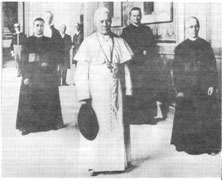 Pope Pius X in the Vatican with his faithful secretaries. |
There is so much that Pope Pius X accomplished in his eleven year reign that it is quite impossible in this article to even mention all the good he did. He ordered the Canon Laws to be gathered together and codified, he restored Gregorian Chant to its proper place in the Church's Liturgy and he wrote many wise and treasured documents and encyclicals. When the French government broke their Concordat signed with the Vatican in 1801, and began grabbing Church property, Pope Pius X would allow no compromise with those villains. Preferring to give up the property to the thieves rather than to let them have control over the clergy, he asked his bishops and the people of France to follow him; even out into the streets, rather than compromise and become slaves of the government. His strong stand resulted in a victory for Catholicism; for they may have lost the buildings but their Faith was strengthened and they were freed from the anti-clerical hand of the government.
Pope Pius X was not just a great leader for the Church, he was also a saint. Numerous miracles were worked by him merely through a blessing or a word. A poor man with a paralyzed arm was asking the Pope for help. Pius X took his arm in his hand and simply said, "Have confidence in the Lord... only have faith and the Lord will heal you." At that moment the man's arm returned to life. The Pope had walked away and the man cried to him with joy, "Holy Father! Holy Father!" But Pius X turned around and put his finger to his lips to indicate to the happy man he was to hold his peace.
An Irish girl, completely covered with sores, was brought by her mom to Rome. When the Pope saw her he put his hand on her head and she was healed.
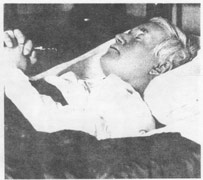 Pope Pius X died in the early hours of August 20, 1914. His last act was to kiss the crucifix he is shown holding. In the sleep of death his countenance was peaceful and almost seemed youthful again. |
Pope Pius X performed astonishing miracles as if it were the easiest thing in the world, and joked about them as if they were insignificant. A Roman schoolgirl had contracted a serious foot disease and had been crippled since she was one year old. Through a friend she obtained one of the Pope's socks; that by wearing it she would be healed. As soon as the girl put Pius' sock on, her diseased foot was instantly healed. When the Pope heard of the miracle he roared with laughter and said, "What a joke! I wear my own socks every day and still I suffer from constant pain in my feet!"
Pope Pius X also had the gift of prophecy, foretelling many events before they came to pass. He foretold births to barren women, reunion of separated couples and other such joyful events. But he is perhaps best known for prophesying the first world war. Whenever Cardinal Merry del Val commented that a war was not expected, or that it would not be for many years, the Pope exclaimed prophetically, "Eminence, before the end of the year 1914!"
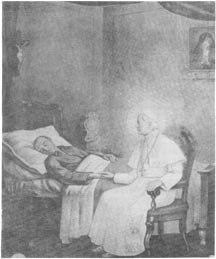 One of the two miracles used for the canonization of Pope Pius X was the cure of Francis Belsani of Naples who was dying of an incurable lung abscess. |
When the war did break out on June 28, 1914 the holy Pope was greatly afflicted and prayed fervently. When seminarians had to leave Rome to return to their native lands to fight one another, Pius X's anguish reached its zenith. With tears in his eyes he admonished the men solemnly: "Show yourselves worthy of the Faith you profess, and in war don't forget mercy and compassion."
On August 15th he felt extremely ill and had to retire to bed. For the next few days he fluctuated, but on the 19th it became certain his end was near.
He gave his last farewell greeting to his faithful friend and loyal co-worker, the Cardinal Secretary of State, who had stood at his side for the past eleven years and had shared his sorrows and joys. The dying Pope could no longer speak, but with a look of great joy and love used his last ounce of strength to embrace and kiss the hand of his friend. The silent gesture gave expression to his whole-hearted gratitude and love. Then he smiled at his sisters and the other Cardinals present around his bedside, inviting them to turn their eyes heavenwards as he breathed his consummatum est. He fell asleep and after a few moments moved once again to make the Sign of the Cross; then he folded his arms, and a mysterious look came over his face as though he beheld the presence of a heavenly visitant. At 1:15 on the morning of August 20th, Pope Pius X kissed his little crucifix and closed his eyes forever.
